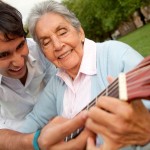
For many of us, music therapy represents a safe, cheap and enjoyable treatment option for older people living in care. A ‘no brainer’ for those responsible for the daily activities provided to keep care home residents active in body and mind.
This small randomised controlled trial conducted by researchers from Taipei Medical University in Taiwan set out to explore the effectiveness of group music therapy as a treatment for reducing agitated behaviour in people with dementia.
104 people with dementia living in a nursing home were randomised to either:
- Half an hour of group music sessions given twice a week for 6 weeks
- Normal daily activities for 6 weeks
Assessments were made before the treatment began, at 3 weeks, at 6 weeks and one month after the treatment was completed. Longitudinal effects were analyzed by means of generalized estimating equations (GEEs).
The researchers reported that the group who received music therapy showed better performance at 3 weeks, 6 weeks and 1 month after treatment on a number of measures:
- Reductions in agitated behaviour in general
- Physically non-aggressive behaviour
- Verbally non-aggressive behaviour
- Physically aggressive behaviour
A reduction in verbally aggressive behaviour was shown only at 3 weeks.
The authors concluded:
Group music intervention alleviated agitated behavior in elderly persons with dementia. We suggest that nursing facilities for demented elderly persons incorporate group music intervention in routine activities in order to enhance emotional relaxation, create inter-personal interactions, and reduce future agitated behaviours.
Such a small trial cannot definitively answer whether or not group music therapy is an effective treatment for agitated behaviour in people with dementia, but given that this type of intervention is easy to provide, safe and lots of fun, it’s likely to be something we see more of in care homes over time.
Lin Y, Chu H, Yang CY, Chen CH, Chen SG, Chang HJ, Hsieh CJ, Chou KR. Effectiveness of group music intervention against agitated behavior in elderly persons with dementia. Int J Geriatr Psychiatry. 2011 Jul;26(7):670-8. doi: 10.1002/gps.2580. Epub 2010 Jul 29. [PubMed abstract]

Is there anything new about this? I have read and seen on the television singing for patients in residential settings (methodist homes for the elderly; they also had picture-collages on private room doors – in a mainstream magazine) and patients with their carers in the community (seen on tv recently); so that is it has been in practice over several years – or developed over that time?
This confirms the singing has benefits and perhaps vindicates positive creative practice!
[…] the Woodland we have previously looked at musical interventions for agitation in dementia and depression. In June 2013 the Cochrane Collaboration published a systematic review of musical […]